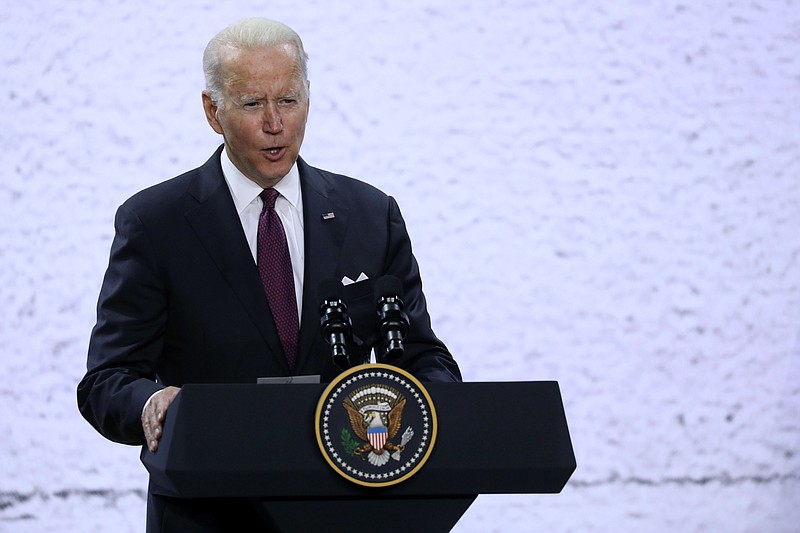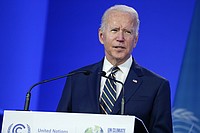GLASGOW, Scotland -- President Joe Biden on Monday told world leaders at the U.N. Climate Change Conference that the Earth is at an inflection point, with limited time left to prevent significant warming to the planet.
"This is the decisive decade," he said in brief opening remarks in Glasgow.
Biden's presence alone signaled a major shift in U.S. policy after four years of turning away from climate issues under former President Donald Trump.
Biden touted his legislative agenda, saying it would provide the resources and legal framework to make good on the U.S. pledge to reduce emissions by at least 50% in the next decade. But while he had hoped to arrive in Glasgow with his agenda approved, its fate remains uncertain.
The president also sought to frame the global increase in energy prices -- which has prompted him to push for more oil production in the short term -- as a reason that countries need to move to renewable energy sources in the longer term.
"We must view it as a call to action," Biden said.
While he did not mention Trump by name, Biden did reference his predecessor, who pulled the United States out of the Paris climate accord.
[Video not showing up above? Click here to watch » https://www.youtube.com/watch?v=7JnJtgxqT5E]
"The United States is not only back at the table, but hopefully leading by the power of our example," Biden said. "I know it hasn't been the case, and that's why my administration is working overtime to show that our climate commitment is action, not words."
The president also stressed the need to provide financial support to less-developed nations, which are bearing much of the burden of the effects of climate change.
He concluded: "God bless you all, and may God save the planet."
DIRE WARNINGS
Also on Monday, British Prime Minister Boris Johnson vividly outlined the difference that a seemingly small rise in global temperatures could make.
The landmark summit in Glasgow is widely seen as a crucial moment when countries must deliver on the Paris agreement of 2015, when leaders agreed to pursue efforts to prevent global temperatures from rising more than 1.5 degrees Celsius (2.7 degrees Fahrenheit) from in preindustrial times.
"Two degrees more, and we jeopardize the food supply for hundreds of millions of people, crops wither, locusts swarm," Johnson said.
One degree more, and the extreme weather patterns the world is already seeing will get a whole lot worse, he said.
"Three degrees, and you can add more wildfires and cyclones, twice as many. Five times as many droughts, and 36 times as many heat waves," Johnson said.
He continued, "Four degrees and we say goodbye to whole cities -- Miami, Alexandria, Shanghai, all lost beneath the waves."
British Cabinet member Alok Sharma, the summit's president, has said the gathering is the "last, best hope" to keep 1.5 degrees within reach.
Meanwhile, Britain's Prince Charles told the world leaders that they should seek solutions to global warming in nature.
"After billions of years of evolution, nature is our best teacher," he said. "In this regard, restoring natural capital, accelerating nature-based solutions and leveraging the circular bio-economy will be vital to our efforts."
Unlike the presidents and premiers who will be speaking at the Scottish Event Campus, the prince has spent his life developing his knowledge about sustainability, organic farming, biodiversity -- and the sanctity of nature, which the prince always capitalizes in print. But also unlike the others, Charles has no real power over laws or budgets.
URGED TO ACTION
As Johnson described global warming as "a doomsday device" strapped to humanity, Queen Elizabeth II said in a recorded welcome message that she hoped the conference would be "one of those rare occasions where everyone will have the chance to rise above the politics of the moment."
"History has shown that when nations come together in common cause, there is always room for hope," the queen said.
U.N. Secretary-General Antonio Guterres told his colleagues that humans are "digging our own graves." And Barbados Prime Minister Mia Mottley, speaking for vulnerable island nations, warned leaders not to "allow the path of greed and selfishness to sow the seeds of our common destruction."
Amid the speeches, Indian Prime Minister Narendra Modi said his coal-dependent country will aim to stop adding greenhouse gases to the atmosphere by 2070 -- two decades after the United States and at least 10 years later than China. Modi said the goal of reaching net zero by 2070 was one of five measures India planned to undertake to meet its commitments under the Paris climate accord.
One of the United Nations' biggest concerns is that some countries are more focused on amorphous long-term net-zero goals instead of seeking cuts this decade that could prevent temperature increases exceeding the Paris goal.
Modi also outlined shorter-term goals for the world's third-biggest carbon emitter: raising its target for non-fossil energy production, meeting half its energy needs with renewable sources, cutting carbon emissions by 1 billion tons compared with previous targets and reducing the carbon intensity of its economy by 45% -- all by 2030.
While 2070 sounds far off for India's pledge, four experts from think tanks and universities said the new short- and long-term goals are significant, while not huge, because of that nation's development status. Ulka Kelkar, who directs India climate policy analysis for the World Resource Institute, said a lot depends on details, but the 2070 goal would be similar to the U.S. and Europe adopting net-zero goals 20 years ago.
Still, European officials privately expressed disappointment at India's late target, though they declined to comment publicly.
European Commission President Ursula von der Leyen touted already announced efforts to make Europe "the first net-zero continent" in the long term and to cut emissions by 55% this decade. She pushed for other rich countries to aid poorer nations as much as Europe does and to put a price on carbon emissions, because "nature cannot pay that price anymore."
FACING RESPONSIBILITIES
Bolivian President Luis Arce said the speeches from developed countries sought to portray them as climate change leaders, "but this is far from the truth." He said rich nations need to face their historic responsibilities for causing the warming problem and not fix it by forcing rules on poor countries. The real solution, he said, "is an alternative to capitalism" and "unfettered consumerism."
Johnson pointed out that the 130-plus world leaders gathered for this portion of the conference had an average age above 60, while the generations most harmed by climate change aren't yet born.
Outside the negotiations, youth climate activist Greta Thunberg accused world leaders of "pretending to take our future seriously."
"Change is not going to come from inside there," Thunberg said. "We say no more blah, blah, blah."
Among the goals for the meeting are getting rich nations to give poor ones $100 billion a year in climate aid and reaching an agreement to spend half the money to adapt to worsening climate effects.
But Mottley warned that negotiators are falling short.
"This is immoral and it is unjust," Mottley said. "Are we so blinded and hardened that we can no longer appreciate the cries of humanity?"
"We are already gasping for survival," said President Wavel John Charles Ramkalawan of the Seychelles, another island nation. "Tomorrow is not an option, for it will be too late."
Guterres struck an equally gloomy note: "Our planet is changing before our eyes -- from the ocean depths to mountaintops, from melting glaciers to relentless extreme weather events."
LEADERS' ROLE
The speeches will continue through today, and then the leaders will leave.
The idea is that they will do the big political give-and-take, setting out broad outlines of agreement, and then have other government officials hammer out the details. That's what worked to make the historic 2015 Paris climate deal a success, former U.N. Climate Secretary Christiana Figueres told said.
"For heads of state, it is actually a much better use of their strategic thinking," Figueres said.
Thousands of people lined up in a chilly wind in Glasgow on Monday to get through a bottleneck at the entrance to the venue. But what will be noticeable are a handful of major absences.
Xi Jinping, president of top carbon-polluting nation China, is not in Glasgow. Figueres said his absence is not that significant because he isn't leaving the country during the pandemic, and his climate envoy is a veteran negotiator.
Biden has chided China and Russia for their less-than-ambitious efforts to curb emissions and blamed them for a disappointing statement on climate change at the end of the meeting of leaders from the Group of 20 major economies in Rome last weekend.
Perhaps more troublesome for the U.N. summit is the absence of several small nations from the Pacific islands that couldn't make it because of covid-19 restrictions and logistics. That's a big problem because their voices relay urgency, Figueres said.
In addition, the heads of several major emerging economies beyond China are also skipping the summit, including those from Russia, Turkey, Mexico, Brazil and South Africa. That leaves Modi as the only leader present from the so-called BRICS nations, which account for more than 40% of global emissions.
Information for this article was contributed by Annie Linskey of The Washington Post; and by Seth Borenstein, Jill Lawless, Frank Jordans and Ellen Knickmeyer of The Associated Press.


